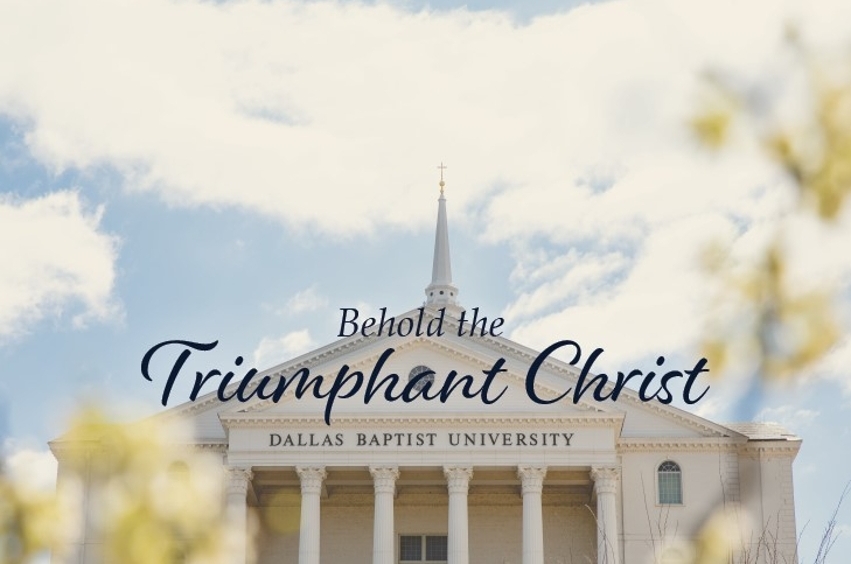His Suffering was Great, but His Faithfulness was Greater: A Reflection on Good Friday
This article is over six months old and may reference former titles for DBU faculty or staff, discontinued programs, or other details that have since changed. If you have any questions, please contact us at news@dbu.edu, or (214) 333-5172.

On the first day of Unleavened Bread, the disciples and Jesus shared a Passover Seder, a specially arranged meal to symbolically commemorate Israel's liberation from bondage in Egypt. During this meal, Jesus revealed to His disciples that one of them would soon betray Him.
"He answered, 'He who has dipped his hand in the dish with me will betray me. The Son of Man goes as it is written of Him, but woe to that man by whom the Son of Man is betrayed! It would have been better for that man if he had not been born.' Judas, who would betray Him, answered, 'Is it I, Rabbi?' He said to him, 'You have said so'" (Matthew 26:23-25).
Following this, Jesus instituted what we know of today as the Eucharist or the Lord's Supper, depending upon your background. He broke bread and told the disciples "this is my body" and with wine, "this is my blood." In this moment, Jesus revealed to the disciples the truth of the Gospel that He is the true Passover Lamb.
The bread signified Jesus' body that was to soon be beaten, battered, and ultimately broken on the cross. The wine signified Jesus' blood, which would soon be fully poured out. This is what the Son of God had taken human form to do: to wash and cleanse us of our sins.
Before the end of this meal, Jesus performed a humble act for His disciples by wasing their feet. Through this, Jesus was telling the disciples that in order to inherit the kingdom of God they must be washed clean from their sins. He foreshadowed ultimate faithfulness—that by dying on a cross He would wash away and cleanse them of their sins. Only He was sinless and could be obedient to the point of death on the cross.
After the Passover and His foretelling of Peter's denial, Jesus went to a place called Gethsemane. Here, Jesus prayed to the Father, and in His prayer, we see the ever-present reality of suffering that Jesus knew He would endure on the cross.
While Jesus never sinned, He knew He would endure suffering on the cross; particularly, the suffering and weight of sin for all humanity. In His prayer Jesus said, "My Father, if it be possible, let this cup pass from me; nevertheless, not as I will, but as you will" (Matthew 26:39). On the eve of His death, Jesus remained faithful to the crucifixion death He knew lay ahead.
Soon after this, Judas delivered Jesus to Caiaphas the high priest, who in turn condemned Jesus of blasphemy, then had him delivered to the chief priests and elders, thus beginning of the final sufferings of Jesus. After the council of priests and elders sentenced Jesus to death, they led Him to Pilate, a Roman official. Christ was scorned and mocked while standing before Pilate. Though Pilate could find no wrong in Him because He was truly blameless and spotless, Jesus was still delivered to be crucified and so fulfilled the will of God.
Before He was taken to the cross, Jesus underwent tremendous physical suffering. "And they stripped him and put a scarlet robe on Him, and twisting together a crown of thorns, they put it on His head and put a reed in his right hand. And kneeling before Him, they mocked Him, saying, 'Hail, King of the Jews!' And they spit on Him and took the reed and struck Him on the head. And when they had mocked Him, they stripped Him of the robe and put His own clothes on Him and led Him away to crucify Him" (Matthew 27:28-31). Even in His physical suffering, Christ did not flee from the crucifixion He knew awaited Him.
As Christ was nailed to the cross, He was mocked and scorned relentlessly, and had a sign placed over His head that read: "This is Jesus, the King of the Jews." Even in His physical suffering, Jesus remained faithful to His death. "And being found in human form, He humbled himself by becoming obedient to the point of death, even death on a cross" (Philippians 2:8).
In His final moments, Christ cried out to God and then yielded His spirit to the Father. At this moment there was a great earthquake, the curtain in the temple tore from top to bottom, and the earth shook.
"When the centurion and those who were with Him, keeping watch over Jesus, saw the earthquake and what took place, they were filled with awe and said, 'Truly this was the Son of God!'" (Matthew 27:54).
So it is on Good Friday that we pause, reflect, and remember this unbelievable moment in human history.
Jesus remained obedient to the Father's will as our atoning sacrifice. He suffered beyond belief, yet His faithfulness and obedience proved even greater.
And the outcome of this incredible demonstration of obedience and faithfulness?
Well, that's a story for Sunday.
Brooks Anthony writes for University Communications at Dallas Baptist University.








